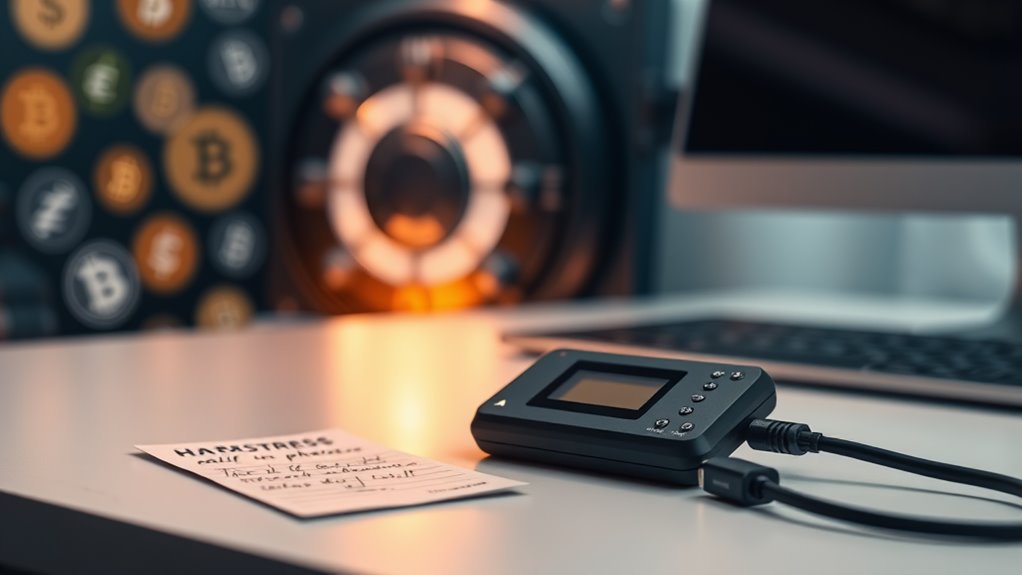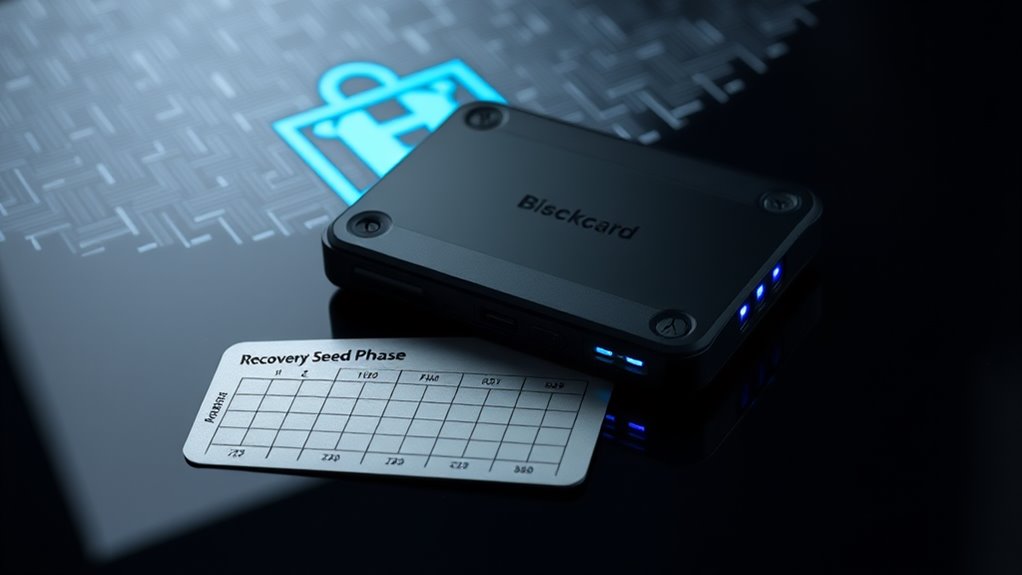Understanding Hardware Wallets for Cryptocurrency Security
Note: This post may contain affiliate links, and we may earn a commission (with No additional cost for you) if you make a purchase via our link. See our disclosure for more info. The crypto world is constantly changing. This content is for informational purposes only and not financial, legal, or professional advice So, please verify the info on the cryptocurrency provider’s websites.
Hardware wallets are the fortress your cryptocurrency needs. Think of them as your digital safe, locking away private keys offline. They dodge hackers and malware like pros. With secure chips and PIN codes, they get a gold star for safety. There are USB, Bluetooth, and even air-gapped options – take your pick. Set up is pretty user-friendly, unlike that weird app your friend recommended. Want to keep your assets safe? There's more to unpack.
 cryptocurrency security through hardware">
cryptocurrency security through hardware">In the wild world of cryptocurrencies, hardware wallets are like the fortress guarding your digital treasure. They don't hold your coins—nope, that's a misunderstanding. They store your private keys offline in secure hardware. Think of it as a secret vault, isolated from the internet, where hackers lurk like shady characters in a dark alley. Instead of leaving your precious keys exposed on a computer, hardware wallets use cold storage to keep them safe.
These gadgets employ secure element chips, similar to those in your credit card. They generate and store keys, ensuring that when you sign a transaction, your private keys remain hidden from prying eyes. It's like a magic trick, except it's real and incredibly necessary. They support multiple blockchains and cryptocurrencies—Bitcoin, Ethereum, you name it. Additionally, these wallets allow users to trade directly from their devices, avoiding deposit delays and fees, which makes them convenient for managing assets.
But let's talk security. Offline storage means you're less vulnerable to hacking and malware. No more worrying about that sketchy Wi-Fi connection at the coffee shop. The secure element chips resist physical tampering, and you can protect device access with PIN codes. Some models even use air-gapped technology, transferring data through QR codes instead of wireless signals. It's like a no-fly zone for hackers.
Plus, open-source firmware lets anyone check the security, so you're not just taking someone's word for it. There's a variety of hardware wallets out there. USB-connected ones are great for portability. Want to go high-tech? Try Bluetooth-enabled models. Or for the ultra-cautious, air-gapped wallets eliminate wireless risks entirely. Cold wallets are considered one of the best methods for storing cryptocurrencies, adding an extra layer of security to your assets. Leading manufacturers like Ledger have maintained an impressive security track record with no instances of remote hacking.
Setting up these wallets is straightforward. You connect them, set a PIN, and back up your recovery phrase. Done. You're ready to protect your crypto assets. Compare that to software wallets, which are constantly online and ripe for attack.
Hardware wallets enforce the golden rule: "Not your keys, not your crypto." So, if you want to keep your digital gold safe, this is the way to go.
Frequently Asked Questions
Can I Use a Hardware Wallet for Multiple Cryptocurrencies?
Absolutely, a hardware wallet can juggle multiple cryptocurrencies like a pro.
Some models support thousands of assets across various blockchains. Think Ledger Nano X, which handles over 5,500 cryptocurrencies and NFTs.
It's like having a Swiss Army knife for your crypto stash.
But hey, don't expect a walk in the park. Setting it up can be a headache, and some wallets have a price tag that might make your wallet cry.
How Do I Recover My Funds if I Lose My Hardware Wallet?
Losing a hardware wallet? Yikes! First, breathe.
You'll need that seed phrase—your golden ticket. If it's safe, install a compatible wallet app. Select "Import Existing Wallet" and enter that seed phrase. Don't mess it up! You can either type it in or scan a QR code.
Set up new security measures. Verify your funds are back. If not, well, better luck next time!
Lesson learned: keep that phrase locked up like it's Fort Knox.
Are Hardware Wallets Completely Immune to Hacking?
No, hardware wallets are not completely immune to hacking. They can be breached through physical tampering, nasty firmware updates, or even good old user error.
Think you're safe just because it's a hardware wallet? Think again. Side-channel attacks can expose your secrets, and supply chain hacks? Yeah, they happen.
How Do I Update the Firmware on My Hardware Wallet?
Updating firmware on a hardware wallet? It's not rocket science but can feel like it.
First, back up that recovery phrase—don't skip it!
Then, head to the manufacturer's website to snag the latest firmware. Connect your device, launch the management software, and follow the prompts.
Don't pull the plug till it's done. Check the version afterward. If things go sideways, well, good luck.
Regular updates are key, folks.
What Happens if the Hardware Wallet Manufacturer Goes Out of Business?
If a hardware wallet manufacturer goes belly up, don't panic just yet. Your wallet can still function.
The private keys? Safe and sound. You can still sign transactions and access your crypto.
But here's the kicker: no more firmware updates. That leaves you exposed to potential software vulnerabilities.
And if you lose your seed phrase, well, good luck getting your funds back. So, keep that phrase safe—like it's the last cookie in the jar.











One Comment